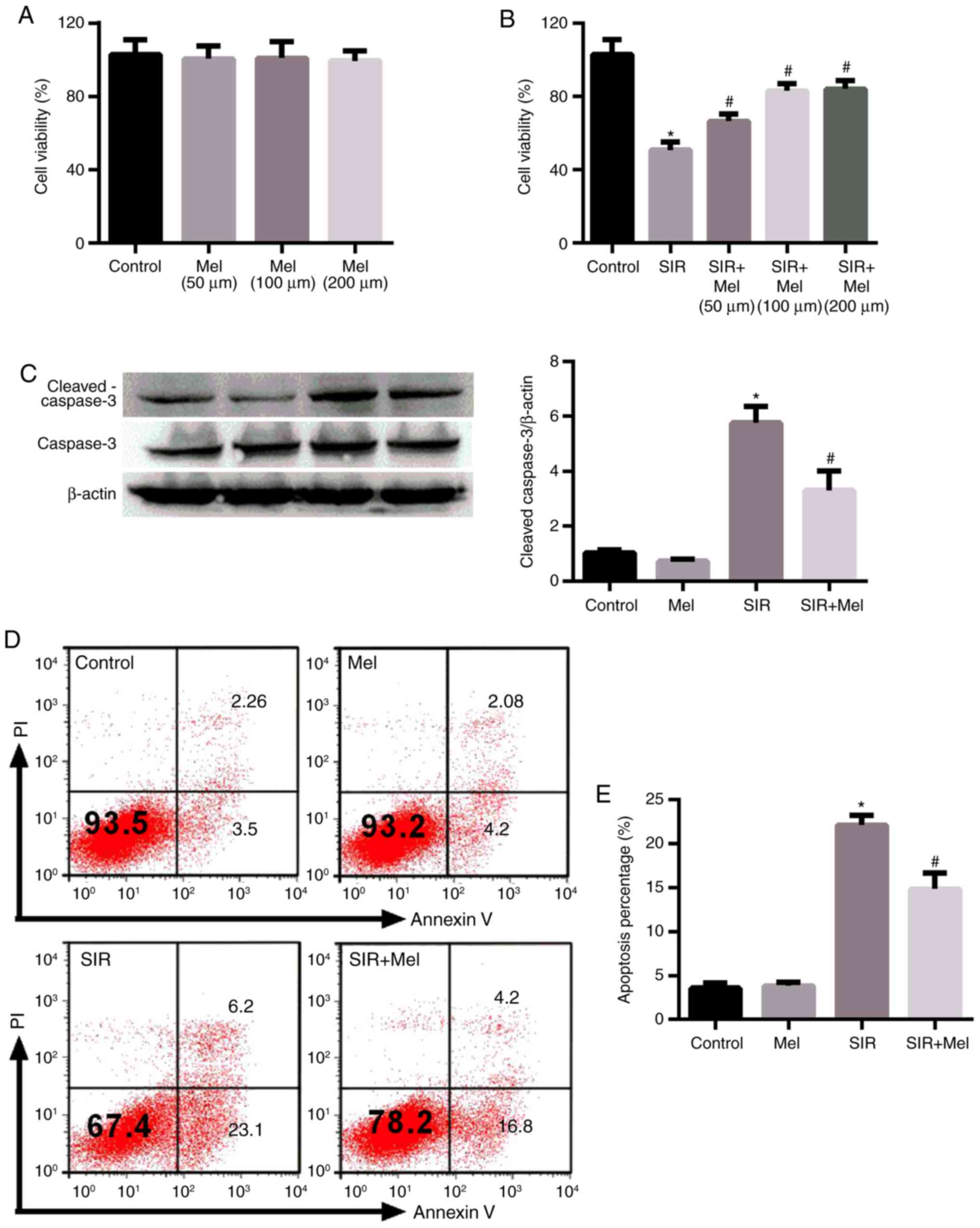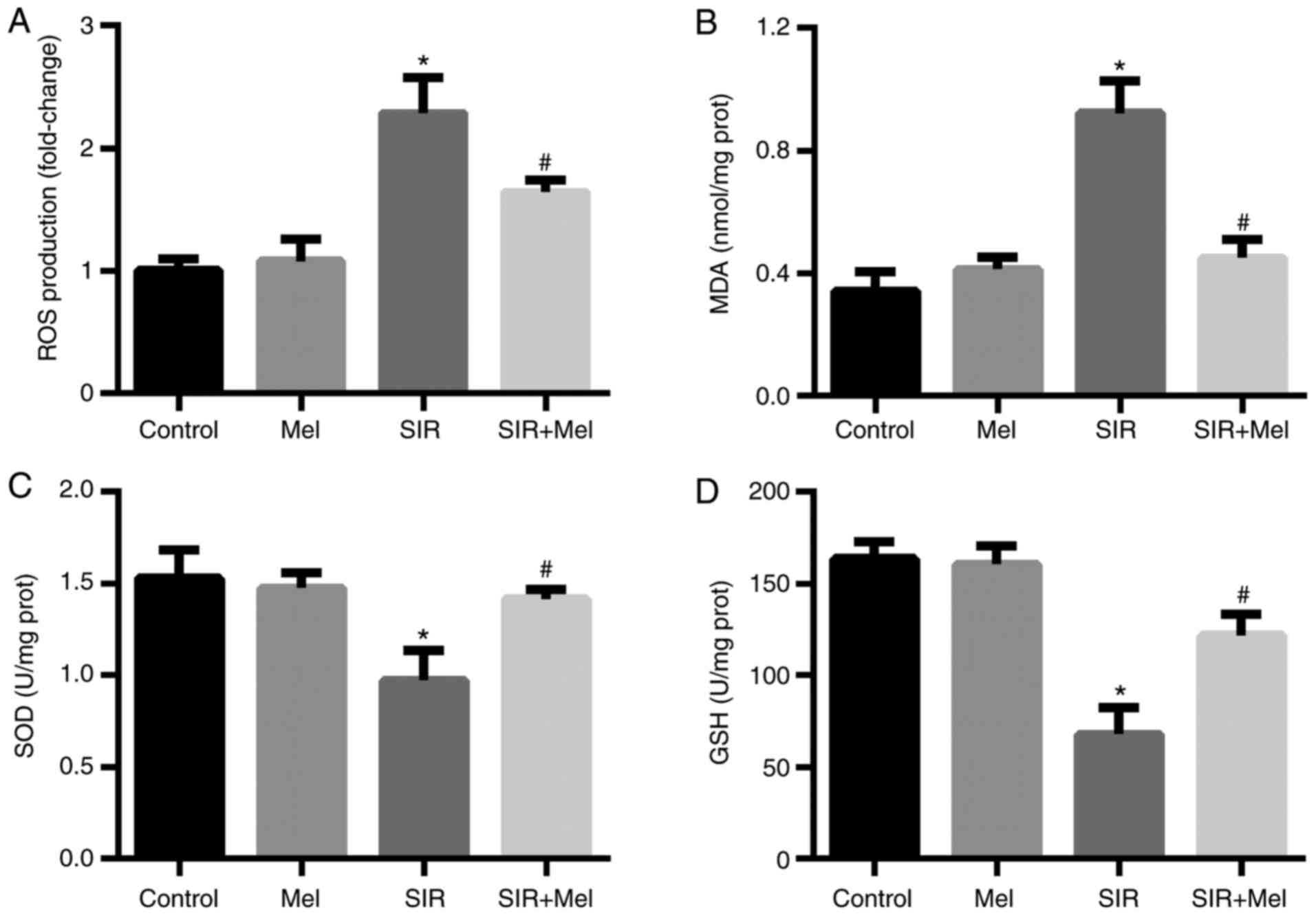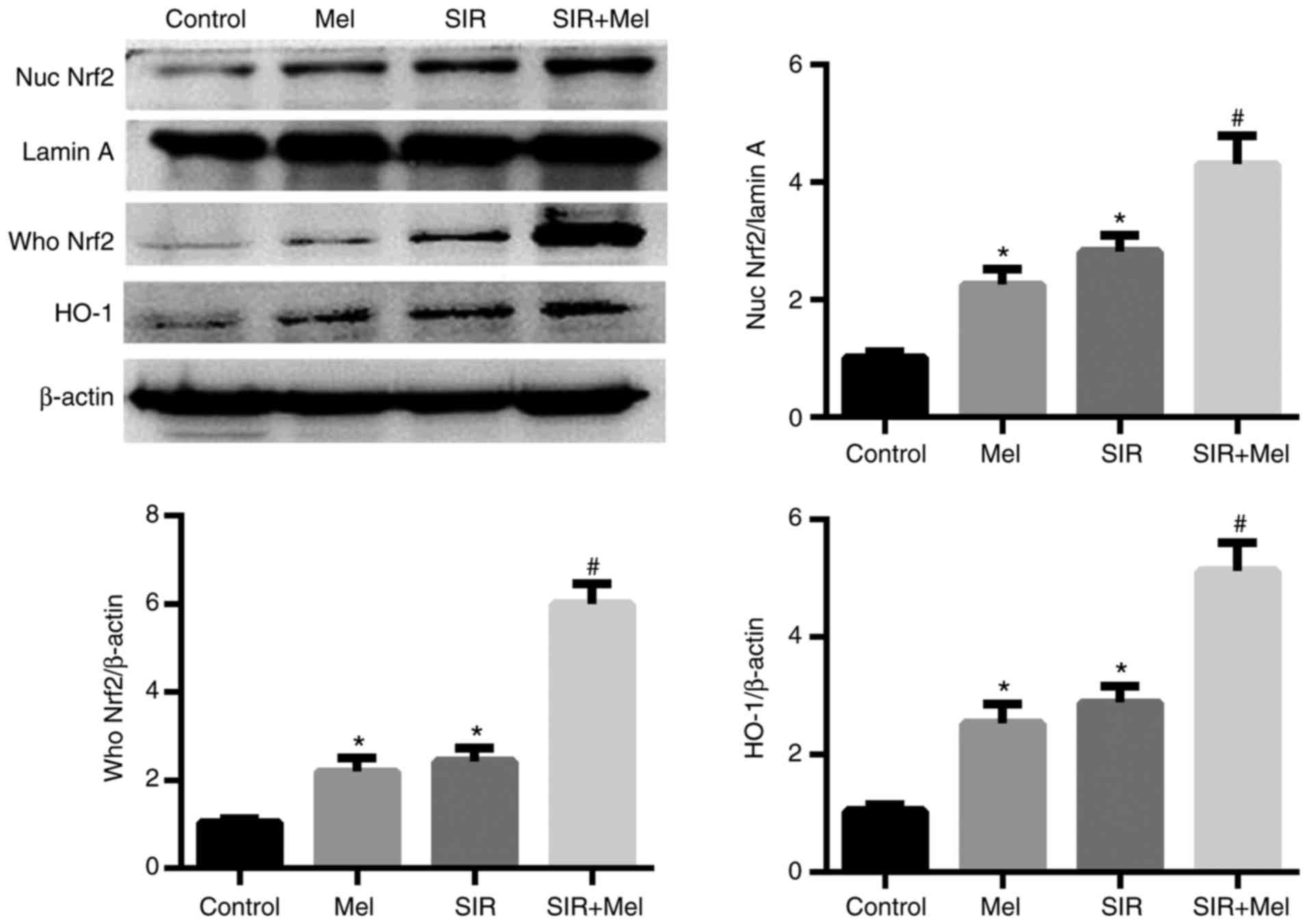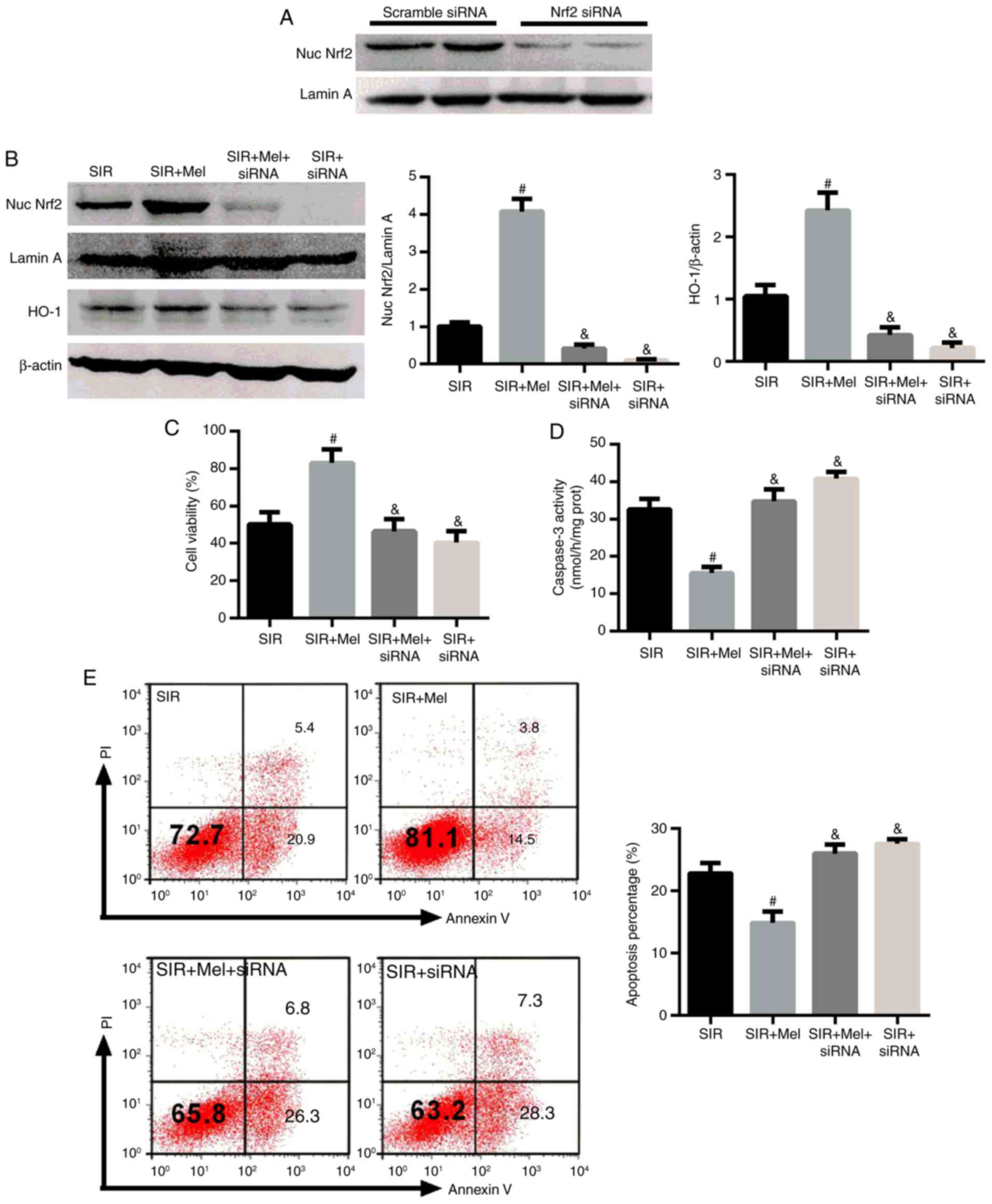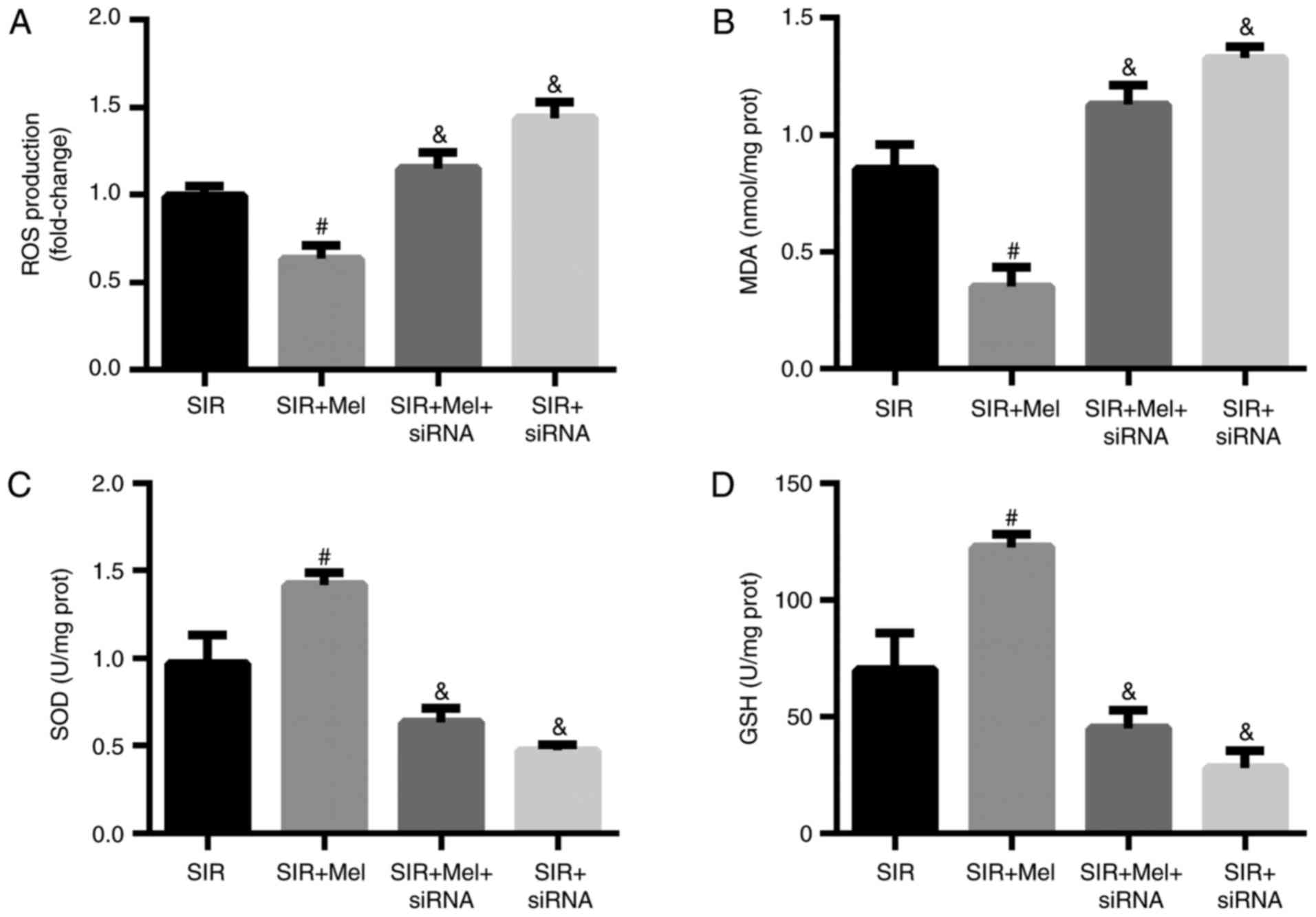|
1
|
Zhang X, Hu H, Luo J, Deng H, Yu P, Zhang
Z, Zhang G, Shan L and Wang Y: A novel
danshensu-tetramethylpyrazine conjugate DT-010 provides
cardioprotection through the PGC-1α/Nrf2/HO-1 pathway. Biol Pharm
Bull. 40:1490–1498. 2017. View Article : Google Scholar : PubMed/NCBI
|
|
2
|
Hu T, Wei G, Xi M, Yan J, Wu X, Wang Y,
Zhu Y, Wang C and Wen A: Synergistic cardioprotective effects of
Danshensu and hydroxysafflor yellow A against myocardial
ischemia-reperfusion injury are mediated through the Akt/Nrf2/HO-1
pathway. Int J Mol Med. 38:83–94. 2016. View Article : Google Scholar : PubMed/NCBI
|
|
3
|
Zhang C, He S, Li Y, Li F, Liu Z, Liu J
and Gong J: Bisoprolol protects myocardium cells against
ischemia/reperfusion injury by attenuating unfolded protein
response in rats. Sci Rep. 7:118592017. View Article : Google Scholar : PubMed/NCBI
|
|
4
|
Liu J, Sui H, Zhao J and Wang Y: Osmotin
protects H9c2 cells from simulated ischemia-reperfusion injury
through AdipoR1/PI3K/AKT signaling pathway. Front Physiol.
8:6112017. View Article : Google Scholar : PubMed/NCBI
|
|
5
|
Sinning C, Westermann D and Clemmensen P:
Oxidative stress in ischemia and reperfusion: Current concepts,
novel ideas and future perspectives. Biomark Med. 11:11031–11040.
2017. View Article : Google Scholar : PubMed/NCBI
|
|
6
|
Lim SH and Lee J: Xyloglucan intake
attenuates myocardial injury by inhibiting apoptosis and improving
energy metabolism in a rat model of myocardial infarction. Nutr
Res. 45:19–29. 2017. View Article : Google Scholar : PubMed/NCBI
|
|
7
|
Toldo S, Marchetti C, Mauro AG, Chojnacki
J, Mezzaroma E, Carbone S, Zhang S, Van Tassell B, Salloum FN and
Abbate A: Inhibition of the NLRP3 inflammasome limits the
inflammatory injury following myocardial ischemia-reperfusion in
the mouse. Int J Cardiol. 209:215–220. 2016. View Article : Google Scholar : PubMed/NCBI
|
|
8
|
Wu SZ, Tao LY, Wang JN, Xu ZQ, Wang J, Xue
YJ, Huang KY, Lin JF, Li L and Ji KT: Amifostine pretreatment
attenuates myocardial ischemia/reperfusion injury by inhibiting
apoptosis and oxidative stress. Oxid Med Cell Longev.
2017:41308242017. View Article : Google Scholar : PubMed/NCBI
|
|
9
|
Liu YF, Chu YY, Zhang XZ, Zhang M, Xie FG,
Zhou M, Wen HH and Shu AH: TGFβ1 protects myocardium from apoptosis
and oxidative damage after ischemia reperfusion. Eur Rev Med
Pharmacol Sci. 21:1551–1558. 2017.PubMed/NCBI
|
|
10
|
Baltatu OC, Amaral FG, Campos LA and
Cipolla-Neto J: Melatonin, mitochondria and hypertension. Cell Mol
Life Sci. 74:3955–3964. 2017. View Article : Google Scholar : PubMed/NCBI
|
|
11
|
Guo Y, Sun J, Li T, Zhang Q, Bu S, Wang Q
and Lai D: Melatonin ameliorates restraint stress-induced oxidative
stress and apoptosis in testicular cells via NF-κB/iNOS and
Nrf2/HO-1 signaling pathway. Sci Rep. 7:95992017. View Article : Google Scholar : PubMed/NCBI
|
|
12
|
Wang Z, Zhou F, Dou Y, Tian X, Liu C, Li
H, Shen H and Chen G: Melatonin alleviates intracerebral
hemorrhage-induced secondary brain injury in rats via suppressing
apoptosis, inflammation, oxidative stress, DNA damage, and
mitochondria injury. Transl Stroke Res. 9:74–91. 2018. View Article : Google Scholar : PubMed/NCBI
|
|
13
|
Bai XZ, He T, Gao JX, Liu Y, Liu JQ, Han
SC, Li Y, Shi JH, Han JT, Tao K, et al: Melatonin prevents acute
kidney injury in severely burned rats via the activation of SIRT1.
Sci Rep. 6:321992016. View Article : Google Scholar : PubMed/NCBI
|
|
14
|
Yu L, Gong B, Duan W, Fan C, Zhang J, Li
Z, Xue X, Xu Y, Meng D, Li B, et al: Melatonin ameliorates
myocardial ischemia/reperfusion injury in type 1 diabetic rats by
preserving mitochondrial function: Role of AMPK-PGC-1α-SIRT3
signaling. Sci Rep. 7:413372017. View Article : Google Scholar : PubMed/NCBI
|
|
15
|
Yu L, Sun Y, Cheng L, Jin Z, Yang Y, Zhai
M, Pei H, Wang X, Zhang H, Meng Q, et al: Melatonin
receptor-mediated protection against myocardial
ischemia/reperfusion injury: Role of SIRT1. J Pineal Res.
57:228–238. 2014. View Article : Google Scholar : PubMed/NCBI
|
|
16
|
Lian Y, Xia X, Zhao H and Zhu Y: The
potential of chrysophanol in protecting against high fat-induced
cardiac injury through Nrf2-regulated anti-inflammation,
anti-oxidant and anti-fibrosis in Nrf2 knockout mice. Biomed
Pharmacother. 93:1175–1189. 2017. View Article : Google Scholar : PubMed/NCBI
|
|
17
|
Dludla PV, Muller CJ, Joubert E, Louw J,
Essop MF, Gabuza KB, Ghoor S, Huisamen B and Johnson R: Aspalathin
protects the heart against hyperglycemia-induced oxidative damage
by Up-regulating Nrf2 expression. Molecules. 22:pii: E129. 2017.
View Article : Google Scholar
|
|
18
|
Bai Y, Chen Q, Sun YP, Wang X, Lv L, Zhang
LP, Liu JS, Zhao S and Wang XL: Sulforaphane protection against the
development of doxorubicin-induced chronic heart failure is
associated with Nrf2 Upregulation. Cardiovasc Ther. 35:2017.
View Article : Google Scholar : PubMed/NCBI
|
|
19
|
Zeng C, Zhong P, Zhao Y, Kanchana K, Zhang
Y, Khan ZA, Chakrabarti S, Wu L, Wang J and Liang G: Curcumin
protects hearts from FFA-induced injury by activating Nrf2 and
inactivating NF-κB both in vitro and in vivo. J Mol Cell Cardiol.
79:1–12. 2015. View Article : Google Scholar : PubMed/NCBI
|
|
20
|
Li W, Wu M, Tang L, Pan Y, Liu Z, Zeng C,
Wang J, Wei T and Liang G: Novel curcumin analogue 14p protects
against myocardial ischemia reperfusion injury through
Nrf2-activating anti-oxidative activity. Toxicol Appl Pharmacol.
282:175–183. 2015. View Article : Google Scholar : PubMed/NCBI
|
|
21
|
Cui G, Luk SC, Li RA, Chan KK, Lei SW,
Wang L, Shen H, Leung GP and Lee SM: Cytoprotection of baicalein
against oxidative stress-induced cardiomyocytes injury through the
Nrf2/Keap1 pathway. J Cardiovasc Pharmacol. 65:39–46. 2015.
View Article : Google Scholar : PubMed/NCBI
|
|
22
|
Chen RC, Sun GB, Wang J, Zhang HJ and Sun
XB: Naringin protects against anoxia/reoxygenation-induced
apoptosis in H9c2 cells via the Nrf2 signaling pathway. Food Funct.
6:1331–1344. 2015. View Article : Google Scholar : PubMed/NCBI
|
|
23
|
Han H, Hu J, Yan Q, Zhu J, Zhu Z, Chen Y,
Sun J and Zhang R: Bone marrow-derived mesenchymal stem cells
rescue injured H9c2 cells via transferring intact mitochondria
through tunneling nanotubes in an in vitro simulated
ischemia/reperfusion model. Mol Med Rep. 13:1517–1524. 2016.
View Article : Google Scholar : PubMed/NCBI
|
|
24
|
Xu J, Li C, Li Z, Yang C, Lei L, Ren W, Su
Y and Chen C: Protective effects of oxymatrine against
lipopolysaccharide/D-galactosamine-induced acute liver failure
through oxidative damage, via activation of Nrf2/HO-1 and
modulation of inflammatory TLR4-signaling pathways. Mol Med Rep.
17:1907–1912. 2018.PubMed/NCBI
|
|
25
|
Zhai M, Li B, Duan W, Jing L, Zhang B,
Zhang M, Yu L, Liu Z, Yu B, Ren K, et al: Melatonin ameliorates
myocardial ischemia reperfusion injury through SIRT3-dependent
regulation of oxidative stress and apoptosis. J Pineal Res.
63:2017. View Article : Google Scholar
|
|
26
|
Yeung HM, Hung MW and Fung ML: Melatonin
ameliorates calcium homeostasis in myocardial and
ischemia-reperfusion injury in chronically hypoxic rats. J Pineal
Res. 45:373–382. 2008. View Article : Google Scholar : PubMed/NCBI
|
|
27
|
Hu ZP, Fang XL, Fang N, Wang XB, Qian HY,
Cao Z, Cheng Y, Wang BN and Wang Y: Melatonin ameliorates vascular
endothelial dysfunction, inflammation, and atherosclerosis by
suppressing the TLR4/NF-κB system in high-fat-fed rabbits. J Pineal
Res. 55:388–398. 2013.PubMed/NCBI
|
|
28
|
Shao G, Zhang S, Nie J, Li J and Tong J:
Effects of melatonin on mechanisms involved in hypertension using
human umbilical vein endothelial cells. J Toxicol Environ Health A.
80:1342–1348. 2017. View Article : Google Scholar : PubMed/NCBI
|
|
29
|
Guo Y, Li Z, Shi C, Li J, Yao M and Chen
X: Trichostatin A attenuates oxidative stress-mediated myocardial
injury through the FoxO3a signaling pathway. Int J Mol Med.
40:999–1008. 2017. View Article : Google Scholar : PubMed/NCBI
|
|
30
|
Satta S, Mahmoud AM, Wilkinson FL,
Alexander Yvonne M and White SJ: The role of Nrf2 in cardiovascular
function and disease. Oxid Med Cell Longev. 2017:92372632017.
View Article : Google Scholar : PubMed/NCBI
|
|
31
|
Ding Y, Chen M, Wang M, Li Y and Wen A:
Posttreatment with 11-Keto-β-boswellic acid ameliorates cerebral
ischemia-reperfusion injury: Nrf2/HO-1 pathway as a potential
mechanism. Mol Neurobiol. 52:1430–1439. 2015. View Article : Google Scholar : PubMed/NCBI
|
|
32
|
Tang J, Li B, Liu C, Li Q, Wang L, Min J,
Hu M, Hong S and Hong L: Mechanism of mechanical trauma-induced
extracellular matrix remodeling of fibroblasts in association with
Nrf2/ARE signaling suppression mediating TGF-β1/Smad3 signaling
inhibition. Oxid Med Cell Longev. 2017:85243532017. View Article : Google Scholar : PubMed/NCBI
|
|
33
|
Ding Y, Zhang B, Zhou K, Chen M, Wang M,
Jia Y, Song Y, Li Y and Wen A: Dietary ellagic acid improves
oxidant-induced endothelial dysfunction and atherosclerosis: Role
of Nrf2 activation. Int J Cardiol. 175:508–514. 2014. View Article : Google Scholar : PubMed/NCBI
|
|
34
|
Jin Y, Huang ZL, Li L, Yang Y, Wang CH,
Wang ZT and Ji LL: Quercetin attenuates toosendanin-induced
hepatotoxicity through inducing the Nrf2/GCL/GSH antioxidant
signaling pathway. Acta Pharmacol Sin. 19–Jun;2018.(Epub ahead of
print). View Article : Google Scholar
|
|
35
|
Zhou Y, Zhang J, Lei B, Liang W, Gong J,
Zhao C, Yu J, Li X, Tang B and Yuan S: DADLE improves hepatic
ischemia/reperfusion injury in mice via activation of the Nrf2/HO1
pathway. Mol Med Rep. 16:6214–6221. 2017. View Article : Google Scholar : PubMed/NCBI
|
|
36
|
Ding Y, Chen M, Wang M, Wang M, Zhang T,
Park J, Zhu Y, Guo C, Jia Y, Li Y and Wen A: Neuroprotection by
acetyl-11-keto-β-Boswellic acid, in ischemic brain injury involves
the Nrf2/HO-1 defense pathway. Sci Rep. 4:70022014. View Article : Google Scholar : PubMed/NCBI
|
|
37
|
Lee MH, Han MH, Lee DS, Park C, Hong SH,
Kim GY, Hong SH, Song KS, Choi IW, Cha HJ and Choi YH: Morin exerts
cytoprotective effects against oxidative stress in C2C12 myoblasts
via the upregulation of Nrf2-dependent HO-1 expression and the
activation of the ERK pathway. Int J Mol Med. 39:399–406. 2017.
View Article : Google Scholar : PubMed/NCBI
|















